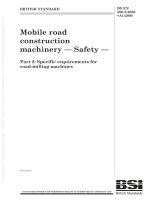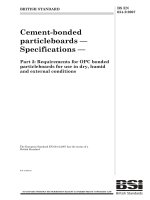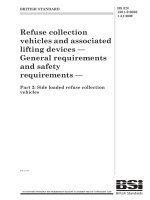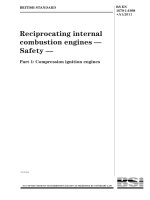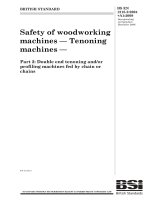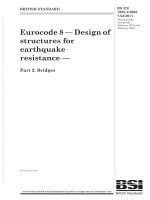Bsi bs en 61937 2 2007 + a1 2011
Bạn đang xem bản rút gọn của tài liệu. Xem và tải ngay bản đầy đủ của tài liệu tại đây (947.77 KB, 16 trang )
BRITISH STANDARD
Digital audio —
Interface for non-linear
PCM encoded audio
bitstreams applying
IEC 60958 —
Part 2: Burst-info
ICS 33.160.30
BS EN
61937-2:2007
+A1:2011
BS EN 61937-2:2007+A1:2011
National foreword
This British Standard is the UK implementation of
EN 61937-2:2007+A1:2011. It is identical to IEC 61937-2:2007
incorporating amendment 1:2011. It supersedes BS EN 61937-2:2007
which is withdrawn.
The start and finish of text introduced or altered by amendment is
indicated in the text by tags. Tags indicating changes to IEC text carry
the number of the IEC amendment. For example, text altered by IEC
amendment 1 is indicated by !".
The UK participation in its preparation was entrusted to Technical
Committee EPL/100, Audio, video and multimedia systems and equipment.
A list of organizations represented on this committee can be obtained on
request to its secretary.
This publication does not purport to include all the necessary provisions of
a contract. Users are responsible for its correct application.
Compliance with a British Standard cannot confer immunity from
legal obligations.
This British Standard was
published under the authority
of the Standards Policy and
Strategy Committee
on 31 October 2007
© The British Standards
Institution 2012
ISBN 978 0 580 77040 1
Amendments/corrigenda issued since publication
Date
Comments
31 January 2012
Implementation of IEC amendment 1:2011 with
CENELEC endorsement A1:2011
EUROPEAN STANDARD
EN 61937-2:2007+A1
NORME EUROPÉENNE
EUROPÄISCHE NORM
December 2011
ICS 33.160.30
Supersedes EN 61937-2:2007
English version
Digital audio Interface for non-linear PCM encoded audio bitstreams
applying IEC 60958 Part 2: Burst-info
(IEC 61937-2:2007)
Audionumérique Interface pour les flux de bits audio
à codage MIC non linéaire
conformément à la CEI 60958 Partie 2: Salve d'informations
(CEI 61937-2:2007)
Digitalton Schnittstelle für nichtlinear-PCM-codierte
Audio-Bitströme unter Verwendung
von IEC 60958 Teil 2: Block-Information
(IEC 61937-2:2007)
This European Standard was approved by CENELEC on 2007-09-01. CENELEC members are bound to comply
with the CEN/CENELEC Internal Regulations which stipulate the conditions for giving this European Standard
the status of a national standard without any alteration.
Up-to-date lists and bibliographical references concerning such national standards may be obtained on
application to the Central Secretariat or to any CENELEC member.
This European Standard exists in two official versions (English and German). A version in any other language
made by translation under the responsibility of a CENELEC member into its own language and notified to the
Central Secretariat has the same status as the official versions.
CENELEC members are the national electrotechnical committees of Austria, Belgium, Bulgaria, Cyprus, the
Czech Republic, Denmark, Estonia, Finland, France, Germany, Greece, Hungary, Iceland, Ireland, Italy, Latvia,
Lithuania, Luxembourg, Malta, the Netherlands, Norway, Poland, Portugal, Romania, Slovakia, Slovenia, Spain,
Sweden, Switzerland and the United Kingdom.
CENELEC
European Committee for Electrotechnical Standardization
Comité Européen de Normalisation Electrotechnique
Europäisches Komitee für Elektrotechnische Normung
Central Secretariat: rue de Stassart 35, B - 1050 Brussels
© 2007 CENELEC -
All rights of exploitation in any form and by any means reserved worldwide for CENELEC members.
Ref. No. EN 61937-2:2007 E
BS EN 61937-2:2007+A1:2011
EN 61937-2:2007+A1:2011 (E)
–2–
Foreword
The text of document 100/1115/CDV, future edition 2 of IEC 61937-2, prepared by Technical Area 4, of
IEC TC 100, Audio, video and multimedia systems and equipment, was submitted to the IEC-CENELEC
parallel Unique Acceptance Procedure and was approved by CENELEC as EN 61937-2 on 2007-09-01.
This European Standard supersedes EN 61937-2:2003.
EN 61937-2:2007 contains the following significant technical changes with respect to EN 61937-2:2003:
– new audio data-types of enhanced AC-3 data, MPEG-2 AAC low sampling frequency, MPEG-4 AAC,
DTS type IV, ATRAC-X, WMA professional and MAT are added;
– data-type field in Pc is expanded from bit 0-4 to 0-6.
The following dates were fixed:
– latest date by which the EN has to be implemented
at national level by publication of an identical
national standard or by endorsement
(dop)
2008-06-01
– latest date by which the national standards conflicting
with the EN have to be withdrawn
(dow)
2010-09-01
Annex ZA has been added by CENELEC.
__________
Endorsement notice
The text of the International Standard IEC 61937-2:2007 was approved by CENELEC as a European
Standard without any modification.
__________
Foreword to amendment A1
The text of document 100/1811/CDV, future edition 2 of IEC 61937-2:2007/A1, prepared by technical
area 4, "Digital system interfaces and protocols", of IEC/TC 100 "Audio, video and multimedia systems
and equipment" was submitted to the IEC-CENELEC parallel vote and approved by CENELEC as
EN 61937-2:2007/A1:2011.
The following dates are fixed:
•
•
latest date by which the document has
to be implemented at national level by
publication of an identical national
standard or by endorsement
latest date by which the national
standards conflicting with the
document have to be withdrawn
(dop)
2012-08-28
(dow)
2014-11-28
Attention is drawn to the possibility that some of the elements of this document may be the subject of
patent rights. CENELEC [and/or CEN] shall not be held responsible for identifying any or all such patent
rights.
Endorsement notice
The text of the International Standard IEC 61937-2:2007/A1:2011 was approved by CENELEC as a
European Standard without any modification.
–3–
BS EN 61937-2:2007+A1:2011
EN 61937-2:2007+A1:2011 (E)
CONTENTS
1
Scope ...............................................................................................................................4
2
Normative references .......................................................................................................4
3
Terms, definitions and abbreviations ................................................................................5
4
3.1 Terms and definitions ...............................................................................................5
3.2 Abbreviations ..........................................................................................................6
Burst-info .........................................................................................................................6
4.1
4.2
4.3
General ...................................................................................................................6
Data-type and subdata-type ....................................................................................6
Audio data-bursts ....................................................................................................8
4.3.1 General .......................................................................................................8
4.3.2 AC-3 ............................................................................................................8
4.3.3 MPEG-1 layer-1 ...........................................................................................8
4.3.4 MPEG-1 layer-2 or -3 or MPEG-2 without extension .................................... 8
4.3.5 MPEG-2 with extension ...............................................................................8
4.3.6 MPEG-2 AAC ..............................................................................................8
4.3.7 MPEG-2 layer-1 low sampling frequency ..................................................... 8
4.3.8 MPEG-2 layer-2 low sampling frequency ..................................................... 9
4.3.9 MPEG-2 layer-3 low sampling frequency ..................................................... 9
4.3.10 DTS type I ................................................................................................... 9
4.3.11 DTS type II .................................................................................................. 9
4.3.12 DTS type III ................................................................................................. 9
4.3.13 DTS type IV ................................................................................................. 9
4.3.14 ATRAC ........................................................................................................ 9
4.3.15 ATRAC 2/3 .................................................................................................. 9
4.3.16 ATRAC-X..................................................................................................... 9
4.3.17 MPEG-2 AAC low sampling frequency ......................................................... 9
4.3.18 MPEG-4 AAC ............................................................................................ 10
4.3.19 Windows Media Audio professional............................................................ 10
4.3.20 Enhanced AC-3 ......................................................................................... 10
4.3.21 MAT .......................................................................................................... 10
4.3.22 MPEG-4 ALS ............................................................................................10
4.3.23 MPEG-4 AAC LC in LATM/LOAS ................................................................10
4.3.24 MPEG-4 HE AAC in LATM/LOAS ...............................................................10
4.3.25 DRA ..........................................................................................................10
Annex ZA (normative) Normative references to international publications with their corresponding
European publications............................................................................................................................11
Table 1 – Fields of burst-info ..................................................................................................6
Table 2 – Data-types ..............................................................................................................7
BS EN 61937-2:2007+A1:2011
EN 61937-2:2007+A1:2011 (E)
–4–
DIGITAL AUDIO –
INTERFACE FOR NON-LINEAR PCM ENCODED
AUDIO BITSTREAMS APPLYING IEC 60958
Part 2: Burst-info
1
Scope
This part of IEC 61970 specifies the digital audio interface to convey non-linear PCM encoded
audio bitstreams applying IEC 60958-1 and IEC 60958-3. This standard specifies burst-info
which defines content information about the data contained in the burst payload.
2
Normative references
The following referenced documents are indispensable for the application of this document.
For dated references, only the edition cited applies. For undated references, the latest edition
of the referenced document (including any amendments) applies.
IEC 60958-1, Digital audio interface – Part 1: General
IEC 60958-3, Digital audio interface – Part 3: Consumer applications
IEC 61937-1, Digital audio – Interface for non-linear PCM encoded audio bitstreams applying
IEC 60958 – Part 1: General
IEC 61937-3, Digital audio – Interface for non-linear PCM encoded audio bitstreams applying
IEC 60958 – Part 3: Non-linear PCM bitstreams according to the AC-3 format
IEC 61937-4, Digital audio – Interface for non-linear PCM encoded audio bitstreams applying
IEC 60958 – Part 4: Non-linear PCM bitstreams according to the MPEG audio formats
IEC 61937-5, Digital audio – Interface for non-linear PCM encoded audio bitstreams applying
IEC 60958 – Part 5: Non-linear PCM bitstreams according to the DTS (Digital Theater
Systems) format(s)
IEC 61937-6, Digital audio – Interface for non-linear PCM encoded audio bitstreams applying
IEC 60958 – Part 6: Non-linear PCM bitstreams according to the MPEG-2 AAC and MPEG-4
AAC formats
IEC 61937-7, Digital audio – Interface for non-linear PCM encoded audio bitstreams applying
IEC 60958 – Part 7: Non-linear PCM bitstreams according to the ATRAC, ATRAC2/3 and
ATRAC-X formats
IEC 61937-8, Digital audio – Interface for non-linear PCM encoded audio bitstreams applying
IEC 60958 – Part 8: Non-linear PCM bitstreams according to the Windows Media Audio
(WMA) Professional format
!IEC 61937-9, Digital audio – Interface for non-linear PCM encoded audio bitstreams applying
IEC 60958 – Part 9: Non-linear PCM bitstreams according to the MAT format"
!IEC 61937-10, Digital audio – Interface for non-linear PCM encoded audio bitstreams
applying IEC 60958 – Part 10: Non-linear PCM bitstreams according to the MPEG-4 audio
lossless coding (ALS) format
IEC 61937-11, Digital audio – Interface for non-linear PCM encoded audio bitstreams
applying IEC 60958 – Part 11: MPEG-4 AAC and its extensions in LATM/LOAS
IEC 61937-12, Digital audio – Interface for non-linear PCM encoded audio bitstreams
applying IEC 60958 – Part 12: Non-linear PCM bitstreams according to the DRA formats"
–5–
BS EN 61937-2:2007+A1:2011
EN 61937-2:2007+A1:2011 (E)
ISO/IEC 11172-3: Information technology – Coding of moving pictures and associated audio
for digital storage media at up to about 1,5 Mb/s – Part 3: Audio
ISO/IEC 13818-3, Information technology – Generic coding of moving pictures and associated
audio information – Part 3: Audio
ISO/IEC 13818-7, Information technology – Generic coding of moving pictures and associated
audio information – Advanced Audio Coding (AAC)
ISO/IEC 14496-3, Information technology – Coding of audio-visual objects – Part 3: Audio
ITU-R Recommendation BS.1196, Audio coding for digital terrestrial television broadcasting
3
3.1
Terms, definitions and abbreviations
Terms and definitions
For the purpose of this document, the following terms and definitions apply.
audio data-burst
data-burst with an encoded audio frame as burst-payload
audio data-word
16-bit data word
audio frame
fixed number of audio samples. The number of samples in an audio
frame is dependent on the particular encoding system which is
used to encode the audio frame into the encoded audio frame
audio gap
period in the sequence of baseband audio samples where valid
samples of audio are not available
bitstream
non-linear PCM encoded audio source, represented in a sequence
of bits. In this interface the bitstream consists of a sequence of
data-bursts
data-burst
packet of data, including the burst-preamble, to be transmitted
across the interface
burst-payload
information content of the data-burst
burst-preamble
header for the data-burst, containing synchronization and
information about the data contained in the burst-payload
data-type
reference to the type of payload of the data-bursts
encoded audio frame
minimum decodable unit of an encoded data sequence. Each
encoded audio frame is the encoded representation of a fixed
number of audio samples (for each original audio channel). The
number of samples which are encoded into an encoded audio
frame depends on the particular encoding system which is used to
encode the audio frame into the encoded audio frame
length-code
length of the data-burst-payload in bits
repetition period
period between the reference point of the current data-burst, and
the reference point of the immediately following data-burst of the
same data-type
sampling frequency
sampling frequency of the encoded PCM audio samples (i.e. before
encoding and after decoding)
sampling period
period related to the sampling frequency of the PCM audio
samples, represented in the encoded bitstream
stuffing
occupying the unused data capacity of the interface
stuffing sub-frame
occupying the unused data capacity in 16-bit audio data words
stream gap
period within the encoded audio bitstream without any audio frame;
a discontinuity in the bitstream. Typically, a stream gap will occur
between encoded audio frames
BS EN 61937-2:2007+A1:2011
EN 61937-2:2007+A1:2011 (E)
3.2
–6–
Abbreviations
ATRAC
Adaptive TRansform Acoustic Coding
ATRAC2
Adaptive TRansform Acoustic Coding 2
ATRAC3
Adaptive TRansform Acoustic Coding 3
ATRAC2/3
ATRAC2 and/or ATRAC3
ATRAC-X
Adaptive TRansform Acoustic Coding-X
ATSC
Advanced Television Systems Committee
IEC
International Electrotechnical Commission
ISO/IEC MPEG
Moving Pictures Expert Group, a joint committee of ISO and IEC
ITU-R
International Telecommunication Union, Radiocommunication
Bureau
MPEG
Motion Pictures Expert Group, a joint committee of ISO and IEC
SMPTE
Society of Motion Picture and Television Engineers
4
Burst-info
4.1
General
The 16-bit burst-info contains information about the data which will be found in the data-burst.
Fields of burst-info is specified in Table 1.
Table 1 – Fields of burst-info
!
Bits of
Pc
Value
0-6
Data-type (defined in IEC 61937-1)
0-4
Conventional data-type
0-31
5-6
7
4.2
See Table 2
Error-flag
0
Error-flag indicating a valid burst-payload
1
Error-flag indicating that the burst-payload may contain errors
8-12
NOTE
See Table 2
Subdata-type
0-3
13-15
Contents
Data-type-dependent info
0-7
Bit-stream-number
Refer to IEC 61937-1, 6.1.7 and 6.1.7.1.
"
Data-type and subdata-type
!Data-type defined in PC bits 0-6 in IEC 61937-1 consists of conventional data-type (0-4) and
subdata-type (5-6) for historical reasons. All conventional data-types and subdata-types are
defined in Table 2.
Further definition of data-type in the reserved area of Table 2 shall be allocated in PC bits 0-6,
in ascending order and without skipping gap."
–7–
BS EN 61937-2:2007+A1:2011
EN 61937-2:2007+A1:2011 (E)
Table 2 – Data-types
!
Data-type
Value of Pc bit 0-6
SubdataConventional
data-type
type
Value of Pc
bit
0-4
Value of
Pc bit
5-6
0
0
Contents
Reference
point R
Null data
See Note 1
1
0
2
0–3
3
0
Pause
bit 0 of Pa
See Note 2
4
0
MPEG-1 layer 1 data
bit 0 of Pa
384
5
0
MPEG-1 layer 2 or 3 data or MPEG-2
without extension
bit 0 of Pa
1 152
6
0
MPEG-2 data with extension
bit 0 of Pa
1 152
7
0
MPEG-2 AAC
bit 0 of Pa
1 024
8
0
MPEG-2, layer-1 low sampling frequency
bit 0 of Pa
768
9
0
MPEG-2, layer-2 low sampling frequency
bit 0 of Pa
2 304
10
0
MPEG-2, layer-3 low sampling frequency
bit 0 of Pa
1 152
11
0
DTS type I
bit 0 of Pa
512
12
0
DTS type II
bit 0 of Pa
1 024
13
0
DTS type III
bit 0 of Pa
2 048
14
0
ATRAC
bit 0 of Pa
512
15
0
ATRAC 2/3
bit 0 of Pa
1 024
16
0
ATRAC-X
bit 0 of Pa
2 048
17
0
DTS type IV
bit 0 of Pa
See IEC 61937-5
0
WMA professional type I
bit 0 of Pa *3
2 048
1
WMA professional type II
bit 0 of Pa
2 048
2
WMA professional type III
bit 0 of Pa
1 024
3
WMA professional type IV
bit 0 of Pa
512
0
MPEG-2 AAC low sampling frequency
bit 0 of Pa
2 048
1
MPEG-2 AAC low sampling frequency
bit 0 of Pa
4 096
2–3
18
19
20
AC-3 data
Repetition period
of data-burst
measured in
IEC 60958 frames
R-AC-3
1 536
Refer to SMPTE 338M
MPEG-2 AAC low sampling frequency
reserved
reserved
0
MPEG-4 AAC
bit 0 of Pa
1 024
1
MPEG-4 AAC
bit 0 of Pa
2 048
2
MPEG-4 AAC
bit 0 of Pa
4 096
3
MPEG-4 AAC
bit 0 of Pa
512
21
0
Enhanced AC-3
bit 0 of Pa
6 144
22
0
MAT
R-MAT
15 360
0
MPEG-4 ALS
bit 0 of Pa
See IEC 61937-10
1
MPEG-4 AAC LC in LATM/LOAS
bit 0 of Pa
See IEC 61937-11
2
MPEG-4 HE AAC in LATM/LOAS
bit 0 of Pa
See IEC 61937-11
3
DRA
bit 0 of Pa
See IEC 61937-12
23
96 – 107
Reserved (do not use until defined)
(24 – 26)
(0 – 3)
27 – 30
0–3
Refer to SMPTE 338M
31
0–3
Extended data-type (do not use until
defined)
NOTE 1
Refer to IEC 61937-1, 7.3.
NOTE 2 The repetition period of pause data-bursts depends on the application. The repetition period of
pause data-bursts is defined for each audio data-burst.
NOTE 3
Refer to IEC 61937-8, 4.2.
"
BS EN 61937-2:2007+A1:2011
EN 61937-2:2007+A1:2011 (E)
4.3
4.3.1
–8–
Audio data-bursts
General
This subclause specifies the audio data-bursts. Specific properties such as reference points,
repetition period, the method of filling stream gaps, and decoding latency are specified for
each data-type.
The decoding latency (or delay), indicated for the data-types, shall be used by the transmitter
to schedule data-bursts as necessary to establish synchronization between picture and
decoded audio.
4.3.2
AC-3
The AC-3 bitstream consists of a sequence of AC-3-frames. The data-type of an AC-3 databurst is 1 and the subdata-type of an AC-3 data-burst is 0. An AC-3 frame represents 1 536
samples of each encoded audio channel (left, centre, etc.). The data-burst is headed with a
burst-preamble, followed by the burst-payload. The burst-payload of each data-burst of AC-3
data shall contain one complete AC-3-frame.
The length of the AC-3 data-burst will depend on the encoded bit rate (which determines the
AC-3-frame length). The specification for the AC-3 bitstream may be found in ITU-R
Recommendation BS.1196; the burst format is specified in IEC 61937-3.
4.3.3
MPEG-1 layer-1
An MPEG-1 layer-1 MPEG-frame represents 384 samples of each encoded channel and can
be transferred using data-type 4 and the subdata-type 0. The data-burst is headed with a
burst-preamble, followed by the burst-payload; see ISO/IEC 11172-3 and IEC 61937-4.
4.3.4
MPEG-1 layer-2 or layer-3 or MPEG-2 without extension
The burst-payload of MPEG-1 layer-2, or layer-3, or MPEG-2 without extension, represents
1 152 samples of each encoded channel and can be transferred using data-type 5 and subdata-type 0. The data-burst is headed with a burst-preamble, followed by the burst-payload;
see ISO/IEC 11172-3, ISO/IEC 13818-3 and IEC 61937-4.
4.3.5
MPEG-2 with extension
The burst-payload of MPEG-2 with extension represents 1 152 samples of each encoded
channel and can be transferred using data type 6 and subdata-type 0. The data-burst is
headed with a burst-preamble, followed by the burst-payload; see ISO/IEC 13818-3 and
IEC 61937-4.
4.3.6
MPEG-2 AAC
The payload of MPEG-2 AAC represents 1 024 samples of each encoded channel and can be
transferred using data-type 7 and subdata-type 0. The data-burst is headed with a burstpreamble, followed by the burst-payload; see ISO/IEC 13818-7 and IEC 61937-6.
4.3.7
MPEG-2 layer-1 low sampling frequency
An MPEG-2 layer-1 frame with low sampling frequency represents 384 samples of each
encoded channel and can be transferred using data-type 8 and subdata-type 0. The databurst is headed with a burst-preamble, followed by the burst-payload; see ISO/IEC 13818-3
and IEC 61937-4.
–9–
4.3.8
BS EN 61937-2:2007+A1:2011
EN 61937-2:2007+A1:2011 (E)
MPEG-2 layer-2 low sampling frequency
The payload of MPEG-2 layer-2 frame with low sampling frequency represents 1 152 samples
of each encoded channel and can be transferred using data-type 9 and subdata-type 0. The
data-burst is headed with a burst-preamble, followed by the burst-payload; see
ISO/IEC 13818-3 and IEC 61937-4.
4.3.9
MPEG-2 layer-3 low sampling frequency
The payload of MPEG-2 layer-3 frame with low sampling frequency represents 576 samples of
each encoded channel and can be transferred using data-type 10 and subdata-type 0. The
data-burst is headed with a burst-preamble, followed by the burst-payload; see
ISO/IEC 13818-3 and IEC 61937-4.
4.3.10
DTS type I
The payload of DTS type I represents 512 samples of each encoded channel and can be
transferred using data-type 11 and subdata-type 0. The data-burst is headed with a burstpreamble, followed by the burst-payload; see IEC 61937-5.
4.3.11
DTS type II
The payload of DTS type II represents 1 024 samples of each encoded channel and can be
transferred using data-type 12 and subdata-type 0. The data-burst is headed with a burstpreamble, followed by the burst-payload; see IEC 61937-5.
4.3.12
DTS type III
The payload of DTS type III represents 2 048 samples of each encoded channel and can be
transferred using data-type 13 and subdata-type 0. The data-burst is headed with a burstpreamble, followed by the burst-payload; see IEC 61937-5.
4.3.13
DTS type IV
The payload of DTS type IV represents samples of each encoded channel and can be
transferred using data-type 17 and subdata-type 0. The data-burst is headed with a burstpreamble, followed by the burst-payload; see IEC 61937-5.
4.3.14
ATRAC
The payload of ATRAC represents 512 samples of each encoded channel and can be
transferred using data-type 14 and subdata-type 0. The data-burst is headed with a burstpreamble, followed by the burst-payload; see IEC 61937-7.
4.3.15
ATRAC 2/3
The payload of ATRAC 2/3 represents 1 024 samples of each encoded channel and can be
transferred using data-type 15 and subdata-type 0. The data-burst is headed with a burstpreamble, followed by the burst-payload; see IEC 61937-7.
4.3.16
ATRAC-X
The payload of ATRAC-X represents 2 048 samples of each encoded channel and can be
transferred using data-type 16 and subdata-type 0. The data-burst is headed with a burstpreamble, followed by the burst-payload; see IEC 61937-7.
4.3.17
MPEG-2 AAC low sampling frequency
The payload of MPEG-2 AAC low sampling frequency represents 2 048 samples of each
encoded channel and can be transferred using data-type 19 and subdata-type 0 or it
BS EN 61937-2:2007+A1:2011
EN 61937-2:2007+A1:2011 (E)
– 10 –
represents 4 096 samples of each encoded channel and can be transferred using data-type
19 and subdata-type 1. The data-burst is headed with a burst-preamble, followed by the burstpayload; see ISO/IEC 13818-7 and IEC 61937-6.
4.3.18 MPEG-4 AAC
The payload of MPEG-4 AAC represents 1 024 samples of each encoded channel and can be
transferred using data-type 20 and subdata-type 0. The payload of MPEG-4 AAC represents 2
048 samples of each encoded channel and can be transferred using data-type 20 and subdata-type 1. The payload of MPEG-4 AAC represents 4 096 samples of each encoded channel
and can be transferred using data-type 20 and subdata-type 2. The payload of MPEG-4 AAC
represents 512 samples of each encoded channel and can be transferred using data-type 20
and subdata-type 3. The data-burst is headed with a burst-preamble, followed by the burstpayload; see ISO/IEC 14496-3 and IEC 61937-6.
4.3.19 Windows Media Audio professional
The payload of WMA professional type I represents 2 048 samples of each encoded channel
and can be transferred using data-type 18 and subdata-type 0. The payload of WMA
professional type II represents 2 048 samples of each encoded channel and can be
transferred using data-type 18 and subdata-type 1. The payload of WMA professional type III
represents 1 024 samples of each encoded channel and can be transferred using data-type
18 and subdata-type 2. The payload of WMA professional type IV represents 512 samples of
each encoded channel and can be transferred using data-type 18 and subdata-type 3. The
data-burst is headed with a burst-preamble, followed by the burst-payload; see IEC 61937-8.
4.3.20 Enhanced AC-3
The enhanced AC-3 bitstream consists of a sequence of enhanced AC-3-frames. The datatype of an enhanced AC-3 data-burst is 21 and the subdata-type of an enhanced AC-3 databurst is 0. The contents of an enhanced AC-3 data-burst represent 1 536 samples of each
encoded audio channel. The data-burst is headed with a burst-preamble, followed by the
burst-payload; see IEC 61937-3.
4.3.21 MAT
The MAT bitstream consists of a sequence of frames. The data-type of an MAT data-burst is
22 and the subdata-type is 0. The data-burst is headed with a burst-preamble, followed by the
burst-payload. The burst-payload of each data-burst of MAT data shall contain 1 complete
MAT frame. The length of the MAT data-burst depends on the encoded bit rate (which
determines the MAT frame length); see IEC 61937-9.
!4.3.22
MPEG-4 ALS
The MPEG-4 ALS bitstream consists of a sequence of frames. The data-type of an MPEG-4
ALS data-burst is 23 and the subdata-type is 0. The data-burst is headed with a burstpreamble, followed by the burst-payload. The burst-payload of each data-burst of MPEG-4
ALS data shall contain 1 complete MPEG-4 ALS frame. The length of the MPEG-4 ALS databurst depends on the encoded bit rate (which determines the MPEG-4 ALS frame length), see
IEC 61937-10.
4.3.23
MPEG-4 AAC LC in LATM/LOAS
The MPEG-4 AAC LC in LATM/LOAS bitstream consists of a sequence of frames. The datatype of an MPEG-4 AAC LC in LATM/LOAS data-burst is 23 and the subdata-type is 1. The
data-burst is headed with a burst-preamble, followed by the burst-payload. The burst-payload
of each data-burst of MPEG-4 AAC LC in LATM/LOAS data shall contain 1 complete MPEG-4
AAC LC in LATM/LOAS frame. The length of the MPEG-4 AAC LC in LATM/LOAS data-burst
depends on the encoded bit rate (which determines the MPEG-4 AAC LC in LATM/LOAS
frame length), see IEC 61937-11.
4.3.24
MPEG-4 HE AAC in LATM/LOAS
The MPEG-4 HE AAC in LATM/LOAS bitstream consists of a sequence of frames. The datatype of an MPEG-4 HE AAC in LATM/LOAS data-burst is 23 and the subdata-type is 2. The
data-burst is headed with a burst-preamble, followed by the burst-payload. The burst-payload
of each data-burst of MPEG-4 HE AAC in LATM/LOAS data shall contain 1 complete MPEG-4
HE AAC in LATM/LOAS frame. The length of the MPEG-4 HE AAC in LATM/LOAS data-burst
depends on the encoded bit rate (which determines the MPEG-4 HE AAC in LATM/LOAS
frame length), see IEC 61937-11.
4.3.25
DRA
The DRA bitstream consists of a sequence of frames. The data-type of a DRA data-burst is 23
and the subdata-type is 3. The data-burst is headed with a burst-preamble, followed by the
burst-payload. The burst-payload of each data-burst of DRA data shall contain 1 complete
DRA frame. The length of the DRA data-burst depends on the encoded bit rate (which
determines the DRA frame length), see IEC 61937-12."
___________
– 11 –
BS EN 61937-2:2007+A1:2011
EN 61937-2:2007+A1:2011 (E)
Annex ZA
(normative)
Normative references to international publications
with their corresponding European publications
The following referenced documents are indispensable for the application of this document. For dated
references, only the edition cited applies. For undated references, the latest edition of the referenced
document (including any amendments) applies.
NOTE When an international publication has been modified by common modifications, indicated by (mod), the relevant EN/HD
applies.
Publication
IEC 60958-1
Year
- 1)
Title
Digital audio interface Part 1: General
EN/HD
EN 60958-1
Year
2004 2)
IEC 60958-3
- 1)
Digital audio interface Part 3: Consumer applications
EN 60958-3
2006 2)
IEC 61937-1
- 1)
Digital audio - Interface for non-linear PCM
encoded audio bitstreams applying
IEC 60958 Part 1: General
EN 61937-1
2007 2)
IEC 61937-3
- 1)
Digital audio - Interface for non-linear PCM
EN 61937-3
encoded audio bitstreams applying
IEC 60958 Part 3: Non-linear PCM bitstreams according to
the AC-3 format
2003 2)
IEC 61937-4
- 1)
Digital audio - Interface for non-linear PCM
EN 61937-4
encoded audio bitstreams applying
IEC 60958 Part 4: Non-linear PCM bitstreams according to
the MPEG audio format
2003 2)
IEC 61937-5
- 1)
Digital audio - Interface for non-linear PCM
EN 61937-5
encoded audio bitstreams applying
IEC 60958 Part 5: Non-linear PCM bitstreams according to
the DTS (Digital Theater Systems) format(s)
2006 2)
IEC 61937-6
- 1)
Digital Audio - Interface for non-linear PCM
EN 61937-6
encoded audio bitstreams applying
IEC 60958 Part 6: Non-linear PCM bitstreams according to
the MPEG-2 AAC and MPEG-4 AAC audio
formats
2006 2)
1)
2)
Undated reference.
Valid edition at date of issue.
BS EN 61937-2:2007+A1:2011
EN 61937-2:2007+A1:2011 (E)
– 12 –
Publication
IEC 61937-7
Year
- 1)
Title
EN/HD
Digital audio - Interface for non-linear PCM
EN 61937-7
encoded audio bitstreams applying
IEC 60958 Part 7: Non-linear PCM bitstreams according to
the ATRAC, ATRAC2/3 and ATRAC-X formats
Year
2005 2)
IEC 61937-8
- 1)
Digital audio - Interface for non-linear PCM
EN 61937-8
encoded audio bitstreams applying
IEC 60958 Part 8: Non-linear PCM bitstreams according to
the Windows Media Audio (WMA) Professional
format
2007 2)
IEC 61937-9
- 1)
Digital audio - Interface for non-linear PCM
encoded audio bitstreams applying
IEC 60958 Part 9: Non-linear PCM bitstreams according to
the MAT format
-
! IEC 61937-10
-
Digital audio - Interface for non-linear PCM
EN 61937-10
encoded audio bitstreams applying
IEC 60958 Part 10: Non-linear PCM bitstreams according
to the MPEG-4 Audio Lossless Coding (ALS)
format
-
IEC 61937-11
-
Digital audio - Interface for non-linear PCM
encoded audio bitstreams applying
IEC 60958 Part 11: MPEG-4 AAC and its extensions in
LATM/LOAS
EN 61937-11
-
IEC 61937-12
-
Digital audio - Interface for non-linear PCM
EN 61937-12
encoded audio bitstreams applying
IEC 60958 Part 12: Non-linear PCM bitstreams according
to the DRA formats "
-
ISO/IEC 11172-3
- 1)
Information technology - Coding of moving
EN ISO/IEC 11172-3
pictures and associated audio for digital storage
media at up to about 1,5 Mbit/s Part 3: Audio
1995 2)
ISO/IEC 13818-3
- 1)
Information technology - Generic coding of
moving pictures and associated audio
information Part 3: Audio
EN ISO/IEC 13818-3
1996 2)
ISO/IEC 13818-7
- 1)
Information technology - Generic coding of
moving pictures and associated audio
information Part 7: Advanced Audio Coding (AAC)
-
-
ISO/IEC 14496-3
- 1)
Information technology - Coding of audio-visual objects Part 3: Audio
-
ITU-R
Recommendation
BS.1196
- 1)
Audio coding for digital terrestrial television
broadcasting
-
-
blank
BS EN
61937-2:2007
+A1:2011
BSI - British Standards Institution
BSI is the independent national body responsible for preparing British
Standards. It presents the UK view on standards in Europe and at the
international level. It is incorporated by Royal Charter.
Revisions
British Standards are updated by amendment or revision. Users of British
Standards should make sure that they possess the latest amendments or
editions.
It is the constant aim of BSI to improve the quality of our products and services.
We would be grateful if anyone finding an inaccuracy or ambiguity while using
this British Standard would inform the Secretary of the technical committee
responsible, the identity of which can be found on the inside front cover. Tel:
+44 (0)20 8996 9000. Fax: +44 (0)20 8996 7400.
BSI offers members an individual updating service called PLUS which ensures
that subscribers automatically receive the latest editions of standards.
Buying standards
Orders for all BSI, international and foreign standards publications should be
addressed to Customer Services. Tel: +44 (0)20 8996 9001. Fax: +44 (0)20 8996
7001 Email: You may also buy directly using a debit/credit
card from the BSI Shop on the Website />In response to orders for international standards, it is BSI policy to supply the
BSI implementation of those that have been published as British Standards,
unless otherwise requested.
Information on standards
BSI provides a wide range of information on national, European and
international standards through its Library and its Technical Help to Exporters
Service. Various BSI electronic information services are also available which
give details on all its products and services. Contact Information Centre. Tel:
+44 (0)20 8996 7111 Fax: +44 (0)20 8996 7048 Email:
Subscribing members of BSI are kept up to date with standards developments
and receive substantial discounts on the purchase price of standards. For details
of these and other benefits contact Membership Administration. Tel: +44 (0)20
8996 7002 Fax: +44 (0)20 8996 7001 Email:
Information regarding online access to British Standards via British Standards
Online can be found at />Further information about BSI is available on the BSI website at http://
www.bsigroup.com
Copyright
BSI Group
Headquarters 389
Chiswick High Road,
London, W4 4AL, UK
Tel +44 (0)20 8996 9001
Fax +44 (0)20 8996 7001
www.bsigroup.com/
standards
Copyright subsists in all BSI publications. BSI also holds the copyright, in the
UK, of the publications of the international standardization bodies. Except as
permitted under the Copyright, Designs and Patents Act 1988 no extract may
be reproduced, stored in a retrieval system or transmitted in any form or by any
means – electronic, photocopying, recording or otherwise – without prior written
permission from BSI.
This does not preclude the free use, in the course of implementing the standard,
of necessary details such as symbols, and size, type or grade designations. If
these details are to be used for any other purpose than implementation then the
prior written permission of BSI must be obtained.
Details and advice can be obtained from the Copyright and Licensing Manager.
Tel: +44 (0)20 8996 7070 Email:

